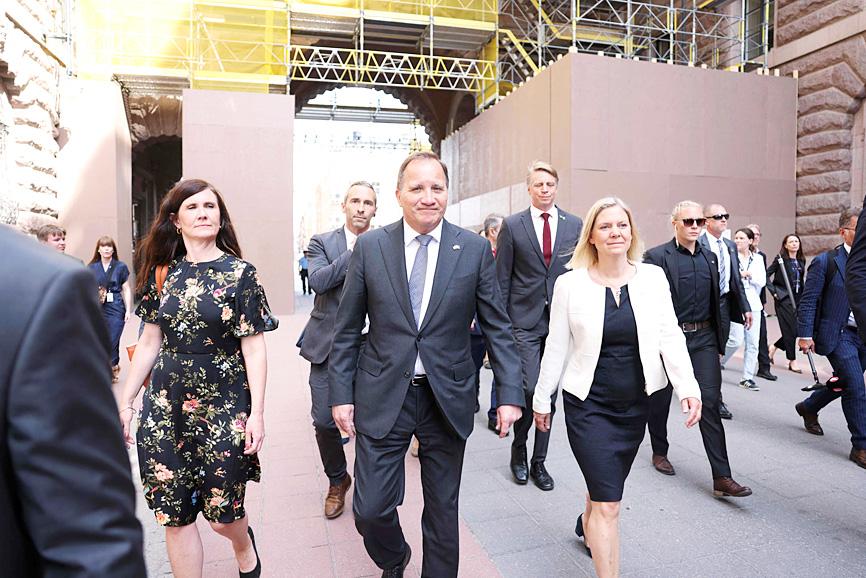The resignation of Swedish Prime Minister Stefan Lofven brings the largest Nordic economy a step closer to its first-ever female prime minister, and with it the task of fixing an ailing political system.
Lofven unexpectedly announced in a Sunday speech that he would step down in November after seven years in power and also quit as the leader of Social Democrats, which dominated Swedish politics for the past century. His minority coalition faced an autumn struggle to pass next year’s budget and the prospect of a defeat from the conservative-nationalist opposition in next year’s elections.
His obvious heir is the Harvard-educated Swedish Minister for Finance Magdalena Andersson, who has held the reins of the Swedish economy throughout the COVID-19 pandemic. A staunch advocate of fiscal prudence, she was criticized by economists before the COVID-19 crisis for building up unnecessary surpluses as public debt shrank to historically low levels.

Photo: AFP
“If she wants to, I believe she will be nominated and the question is then if she’ll be appointed in unity and with a strong mandate by the congress,” Gothenburg University political science professor Ulf Bjereld said.
Lofven, the great political survivor, came to represent the impasse that Sweden found itself in. The Swedish economy has been among the most resilient to the pandemic thanks to prudent public finances, yet Swedish society struggled to deal with an open-door policy that strained its generous welfare state and stoked anti-immigrant sentiment.
A new leader for the Social Democrats is to be elected at the party congress starting on Nov. 3 and whoever is chosen would become prime minister if confirmed by parliament. While Andersson is the frontrunner, other candidates include Minister for Digital Development Anders Ygeman and Minister of the Interior Mikael Damberg.
A precedent of women leading governments has already been set in the Nordics so that aspect is unsurprising. Norway, Denmark, Finland and Iceland are now run by women.
As for Andersson, she declined to comment on the political situation. Her spokesman said she was busy preparing the budget.
Earlier this year, she became the first woman to chair the International Monetary and Financial Committee, the main advisory body to the Washington-based IMF.
What is less clear is how markets would react to the latest Swedish twist. In the recent past, stocks and bonds have been impervious to political shenanigans.
“In a situation where we have strong government finances and very low interest rates, I do not think politics and the autumn budget will have a particularly large market impact,” Hans Sterte, the deputy CEO of Alecta, one of Sweden’s largest pension managers, said in an e-mailed response to Bloomberg questions.
The markets “should at least keep one eye on” the coming year in the Swedish politics, said Jens Peter Sorensen, chief analyst at Danske Bank A/S.
“The government’s budget runs a big risk of not being accepted by the Riksdag, and the New PM might have to govern on the opposition’s budget, not a smooth start in office, but also what Lofven on occasions has been forced/accepted to do,” he said. “That precarious risk underlines the fragile situation for the government that has become even weaker after the political turmoil this summer,” he said.
The bigger question is where Sweden goes from here and how it builds toward a more sustainable future that is not punctured by all-to-frequent government collapses and political paralysis. The Social Democrats currently control about a third of the seats in parliament in partnership with the Green Party.
However, the reality is that the government’s handling of the pandemic and the rise in the polls of the Swedish Democrats, whose roots date to the neo-Nazi movements, have taken a toll on the electorate. Their popularity demanded a change of tack that eventually precipitated the end of Lofven, a political career too linked to the past.
The Social Democrats, credited with a generous welfare state paid by some of the world’s highest income taxes, are also a party that owes its political success to an industrial backbone that no longer exists. If the budget does not pass, or if there is another misjudged step, Sweden could face its first snap elections since 1958.

THE TRAGEDY OF PUNCH: Footage of the seven-month-old Japanese macaque has gone viral online after he was rejected by his mother and formed a bond with a soft toy A baby monkey in Japan has captured hearts around the world after videos of him being bullied by other monkeys and rejected by his mother went viral last week. Punch, a Japanese macaque, was born in July last year at Ichikawa City Zoo. He has drawn international attention after zookeepers gave him a stuffed orangutan toy after he was abandoned by his mother. Without maternal guidance to help him integrate, Punch has turned to the toy for comfort. He has been filmed multiple times being dragged and chased by older Japanese macaques inside the enclosure. Early clips showed him wandering alone with

Australian Prime Minister Anthony Albanese yesterday said he did not take his security for granted, after he was evacuated from his residence for several hours following a bomb threat sent to a Chinese dance group. Albanese was evacuated from his Canberra residence late on Tuesday following the threat, and returned a few hours later after nothing suspicious was found. The bomb scare was among several e-mails threatening Albanese sent to a representative of Shen Yun, a classical Chinese dance troupe banned in China that is due to perform in Australia this month, a spokesperson for the group said in a statement. The e-mail

TENSIONS: The march went ahead without clashes, but arrests were still possible as police investigate suspects behind Nazi salutes, racist slurs and homophobic insults Thousands of people on Saturday marched in southeastern France under heavy security in tribute to a far-right activist whose killing, blamed on the hard left, has put the country on edge. The crowd — many wearing black and some covering their lower faces with masks — marched through the city of Lyon carrying flowers and placards bearing pictures of Quentin Deranque and the words: “justice for Quentin” and “the extreme left kills.” The 23-year-old died from head injuries following clashes between radical left and far-right supporters on the sidelines of a demonstration against a politician from the left-wing France Unbowed

‘OCCUPATION’: Hong Kong said it had lodged ‘stern protests’ with Panama’s consulate, and would ‘staunchly support’ the rights and interests of Hong Kong companies Panamanian President Jose Raul Mulino on Monday ordered the temporary occupation of two ports run by a unit of CK Hutchison Holdings Ltd following the Supreme Court’s ruling against the firm’s concession, escalating a dispute that has become a proxy battle between the US and China in Latin America. Mulino said in a speech that the administration and operation of the two ports on the strategic Panama Canal is to revert to the country’s National Maritime Authority to ensure their uninterrupted, safe and efficient operation. The occupation covers movable equipment at the ports and does not mean a definitive loss of